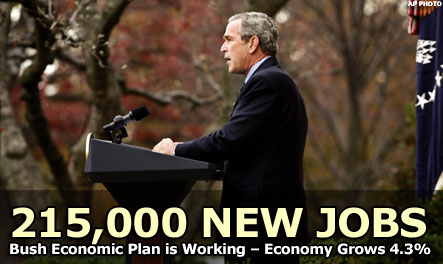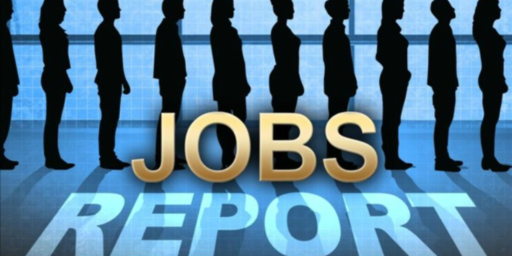Partisan Blinders on the Economy
Seems to me that there is quite a bit of partisan nonsense about the economy right now.
And it isn’t just from the GOP’s official website.
Is 215,000 jobs good? Well, sure it is better than 0 zero job growth in the non-farm payroll survey, and it sure beats the heck out of negative numbers, but it really isn’t all that great. Putting up a picture like that and making it out to be something grand is definitely the case of lowering the bar. For example, if we return to the days of Clinton, we’d see that on average the non-farm payroll increased by just under 240,000 jobs. Further, 68% of the 96 months Clinton was in office the non-farm payrolls growth was in excess of 200,000, 50% were in excess of 250,000 and 27% in excess of 300,000. Yes, yes, I know the tech bubble and all that. While there was definitely a bubble at the end of Clinton’s terms, I think one could argue there is a real estate bubble currently. So, if you want to discount the non-farm payroll numbers from the end of Clinton’s term, then discount these as well on the grounds of consistency.
Or better yet, lets not pretend that 215,000 is all that big a deal. Especially considering that the month before only 44,000 jobs were added and the month prior to that a paltry 17,000 jobs were added. Granted going back yet another month we’d see 277,000 jobs added, but the average over those 5 months is a disappointing 140,200 jobs per month.
And saying that prices for gasoline are dropping back to the pre-Katrina and we are “sitting pretty” levels is kind of like saying that things are looking great because instead of spending $25 to fill up your gas tank, now you spend $22.50! Ye-haw! With savings like that it’s going to be a good Christmas. Lets ignore that natural gas prices are still very high, likely to go higher, and this in turn will mean that electricity is more expensive as well.
And the audacity at the Republicans to put this in their press release,
The foundation for growth is strong. It’s based upon low taxes and restrained government spending, legal reform, incentives for saving and investment.–emphasis added
Kerrwhat?!?! Let me read that again. I think I’m going to have to call Bravo Sierra on the emphasized portion of that comment. Exactly what kinds of “restrained government spending” did President Bush have in mind? The black hole that is better known as the Sorta Free Drugs for Old People Medicare Program? Or is it the No Child Left Behind Program that has bloated federal educational spending to new heights?
We’re not going to rest until every American who wants a job can find one. We’re going to continue to work for good policies for our workers and our entrepreneurs. I’ll continue to push for pro-growth economic policies, all aimed at making sure every American can realize the American Dream.
Ahhh, nothing like big government Republicans who are going to take care of each and everyone of us. I just love a paternalistic state.
Update: Link to me will ya! Actually, Bryan brings up a couple of good points. First, I forgot about the horrible highway spending bill and the infamous bridge to nowhere. Then he also mentioned the free trade angle. Bush talks good on trade, but that is all it is, he is far more protectionist than Clinton. And, Bryan and I both forgot the energy bill, another pork laden piece of crap from the Bush Administration. The Bush Administration spends like a heroin addict with a serious jones.







Comparing job increases at this stage under Bush vs under Clinton is utter nonsense, Steve. The fact of the matter is that Clinton was able to get bigger job incresaes because there were MORE JOBLESSS to begin with.
In short, the job picture is about saturated, and so there will be some added resistance to new jobs being created…. a situation that NEVER occurred under Clinton.
In short, the job picture is about saturated, and so there will be some added resistance to new jobs being created….
Yes. Tell that to the workers at GM and Ford.
Bithead, does this administration ever make mistakes? Just curious.
Bithead,
I’m sorry that is just baloney. The unemployment rate is higher now than it was under Clinton so that argument makes no sense. Also, if you look at the data by decade the same result occurs. During the 1980’s the average number of jobs added per month to the non-farm payroll were 151,000. In the 1990s’ 181,000, and since 2000 52,000. Granted part of the problem is that there are fewer years with boom years from 2000 on, but even looking at the monthly data from the end of the recession onwards it is fairly obvious that the growth in jobs in the non-farm payroll data is a bit lackluster.
So, your complaint isn’t that there are not enough jobs, but rather, your complaint is that there aren’t enough UNION jobs?
Oh, I’ve ripped them a new one on several occasions.
If your suggestion is that this is altogether cyclical, how is Bush to blame for that? Boy, that Rove is a real evil genius to be able to reach back in history and create those datapoints, eh?
Ah. So, we’re to ignore a war, and a couple hurricanes, and their effect on the economy? I mean, can we agree that without these, the result would be more significant levels of growth?
So, your complaint isn’t that there are not enough jobs, but rather, your complaint is that there aren’t enough UNION jobs?
Who said anything about union jobs? A job lost is a job lost is a job lost IMHO. I’m not a big fan of that whole “if you want an omelette you’ve got to break a few eggs” line of reasoning economists like to lay on about growing the economy anyway.
“Restrained government”??
Of all the whoppers to come from the Bush admin, it is possible that this takes the prize.
Unless that is, they are talking about various rights that have been “restrained”.
Why, you did.
Or am I to understand you didn’t know those were union jobs?
Bithead,
Let me be very clear here. Your first complaint is shot out of the water and is utterly destroyed. Now it is a war (that is probably good for employment here in the U.S….wars usually are), hurricanes that have occured only this last summer for the most part, and this is to have caused the lackluster employment data as seen in the payroll survey from Nov. 2001 to the present? Have I got your new position correct?
Note that by looking at the 80’s, 90’s and the 00’s we have a recession in each of those decades (two actually in the 80s). So this notion of cyclical behavior in the data while true is a red herring.
The bottom line is that while the data are okay, they sure as Hell isn’t great in terms of the payroll survey. Sure declining energy prices in some sectors is good, but they are not going down or even up in others. Investment and profits are good, and confidence is up, so on the hole its a decent picture. But trying to make these payroll numbers look good is just dumb.
Let me be very clear here. Your first complaint is shot out of the water and is utterly destroyed.
If you do say so yourself.
No, Steve, but you knew that before asking, I suppose.
There were two things affecting the Economy in 2001… the Clinton recession, and 9/11. SInce then, 9/11 and it’s consequences are still with us… and now have the series of natural disasters to join them. Given that, I’d make the observation that we’re lucky we’ve done this well.
In light of the problems litsed, I would take the opposite tack; trying to make them look BAD is dumb.
Well, the data don’t support your claim, further you completely abandoned it. What more do I need?
As for the “Clinton” recession, it was actually rather shallow and short lived. However, that being said it did result in more structural unemployment than cyclical unemployment than in previous recessions. The thing with structural unemployment is that it takes longer to recover. Hence the long lag time in terms of dating the recession and the lack luster unemployment numbers. As for 9/11, the National Bureau of Economic Research has noted that its impact on the economy was relatively light in that the recession was dated as ending in November 2001!
Let me see, I have the data on my side, the fact that the recession wasn’t all that bad, 9/11 didn’t have as adverse an impact as many thought…I’m sorry Bithead I’m just can’t seem to do the partisan blinders thing.
Facts would be a nice start. The data is NOT on your side as you claim, unless you filter out the events and datapoints I’ve listed. And YOU talk about “Partisan Blinders”?
Because by the time it occurred, Bush was already in office. But the point you’re missing is that instead of starting from a posiiton of financial strength, Bush ahd a lotta ground to make up because of the mess left him by Clinton. If that were not true, I suppose, we’d ahve been in far better shape these last few years, despite the other setbacks.
It was certainly lighter than it would have been under CLinton, or, (God help us) Gore, but I think the date as mentioned a bit over-happy. And that still does nothing to counter the idea that with that Clinton recession, and 9/11, we’d be in better economic shape.